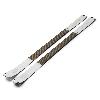Fabio Valseschini, interview after the first winter solo on Civetta
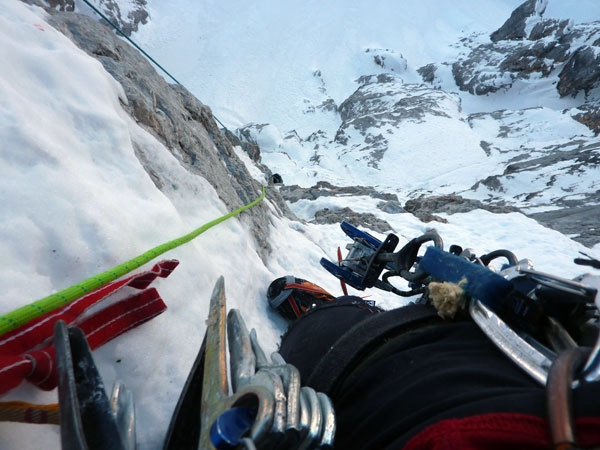
 1 / 8
1 / 8 F. Valseschini
F. Valseschini
There are some ascents which strike the heart and capture the imagination of alpinists. Without a doubt, Fabio Valseschini's first solo winter ascent of the route Via dei 5 di Valmadrera is one of these. The reasons for this are manifold: one of which are those 8 bivies spent on the mountain. And those 1300m of VI+ and A3 in the center of the NW Face of Monte Civetta, the mountain which symbolises alpinism not only in the Dolomites but also further afar. One might also add that Valseschini and his ascent are reminiscent of a great alpinism, one of those immense undertakings of yesteryear. All of these points are correct and, at the same time, relative, because after this intense interview, we believe there is more, much much more...
Fabio, how did this winter solo come about?
When you set off on a climb you make an instinctive choice. And there are many different things, all jumbled together, which lead to a decision. This is how all my ascents have come about: they're all choices which stem from the heart.
What is certain is that this latest ascent has received ample recognition, perhaps more than your other climbs...
Yes, even if I have to admit I've never understood why some climbs get more limelight than others, why some strike a cord more than others. For me a grade VI in the Dolomites is equal to a grade VI on other mountain faces, like ours, here in the Central Alps. What is clear though is that if you climb a route in winter, alone and not in your backyard - on your mountains - then it can be different and in some respects harder...
Tell us about what prompted you to carry out this first solo winter ascent on Civetta...
As I said, a spark sets the flame to a project which initially is never clearly defined. Sometimes things are improvised and there are many different factors which come into play. It's difficult to explain... also because sometimes you decide for a particular climb and then circumstances arise which make you climb something completely different. The decision to climb a mountain face, a particular climb, depends on many different things and can come from afar. For example, the first time I summited Civetta was in 2003. In truth, I didn't really know what the NW Face was, I didn't know anything about its history. At the time Marco Perego, my unforgettable climbing partner, had suggested we climb the Philip-Flamm up Punta Civetta. The route didn't transmit that much to me at but as it happened, on that very same day Claudio Moretto and Rosy Buffa carried out the second repeat of Via dei 5 di Valmadrera. Marco told me it was a difficult route, but all I discovered was the "alpine rivalry" between Valmadrera and Lecco, not much else. Perhaps it was Marco's words which got me curious, got me thinking about that route and line as a possibility.
And then what happened?
Another episode which paved the way for this story was my first winter solo ascent of Via del Fratello up the ENE Pillar on Pizzo Badile in 2006. After the ascent we celebrated with the "gang of 5" at Gianni Rusconi's house (the first ascentionist of both routes mentioned above, Editor's note) - and someone casually mentioned that the Civetta route still awaited its first winter ascent. This is what got the ball rolling, almost by chance. And so my curiosity grew, bit by bit, one step after the next,
And so, where did this curiosity lead you?
To my first attempt last year. Thanks to that experience I got to know new people, made new friends. The same happened last summer, when I decided to climb Via degli Amici (which runs next to 5 di Valmadrera, Editor's note). New friendships were made on that occasion which proved fundamental for my winter solo. All these people have been an integral part of my ascent, of the final result. This is something I've always been aware of.
What did last year's failed attempt teach you?
That the moment was wrong. I climbed two pitches and then a huge mass of snow swept past me. Once again a guardian angel protected me : evidently the time wasn't ripe.
Then a month ago you attempted again, in anything but ideal conditions...
Yes. And this too got me thinking that individual choices and a climb are a "battle" comprised of numerous different elements: last month, too, I had chosen to make the climb for myself but also for all those friends who had helped me.
And then you set off for the successful climb. Were you worried?
I always try to avoid being presumptuous. Which means I find it impossible to program that dose of self-belief which allows you to climb carefree. But when I set off, I always set off 100% convinced. I believe it's possible, right down to the bone. And then of course there are things which you understand immediately: you know that the time has come for dreams, training, all the effort and the friends who have helped you, to come together at just the right moment. And thankfully this is exactly what happened.
So now the time has come to tell us about your experience on I 5 di Valmadrera... how would you describe it?
It's a logical line. Gianni and Antonio Rusconi, together with Gianbattista Crimella, Giambattista Villa and Giorgio Tessari had just the right vision. It's a great route with three different spheres inside it. The first section up to the ledge contains the real mystery, one of those with some unprotectable sections which are climbed by "closing your eyes" and taking risks. It's a section of which dreams are made of. Up there, with boots and crampons, you feel like you're in one of those great photos which immortalised the pros. The ambient is so overwhelming that you feel like a professional alpinist; you really feel like you're one of them, even though you're not.
Then, from the ledge upwards...
The overhanging section begins above the ledge. I climbed this with rock shoes. Here you need to understand how to place pegs. Invent things to get past sections, improvise. It may seem simple, but I'm not used to this sort of aid climbing... and for me it really was like inventing some sort of "circus trick".
And then there's the final section...
The third and final section of the route projects you to a completely different place. You need to find the right line past spurs, pillars, crests, you need to leave the main face and then return to it. You're in a high mountain environment, but it seems like you're somewhere completely different, in the Himalaya for example. In short, on this rock face and route I went on a complete journey, experienced a thousand different emotions.
A long journey indeed! So much so that many will have asked themselves what went through you mind during those 8 days alone on the wall...
I have to say that I manage to concentrate 100% on my climbing. I think about how to do the next move. How to place the next piece of pro. Then of course there are so many other things that need doing: prepare the bivy, make something to eat, check the gear... And then when I finally relax, when I'm in my sleeping bag, then I think about many different things. About places I've been to, where I'd like to go, things which perhaps have nothing to do with alpinism itself. I think about journeys and about my other great love, diving. I'm lucky because I tend to sleep fairly well... and before falling asleep I listen to music, usually rock. And in the end there really isn't that much time to sit back and think.
Talking of which. What went through your mind at the bivies?
It may seem strange, but after 10 years of alpinism - I took my first rock climbing lessons aged 30, in the year 2000 - I've started to think that perhaps the time has come to leave this all behind, to abandon alpinism for something else. Perhaps I'll start doing breath-hold diving which I'm really keen on. It's not as if I'm tired of alpinism but when you're torn between two great loves, it's always difficult to decide.
Did you encounter any particular difficulties during the ascent?
As I said previously, when I climb I'm completely immersed in the actual ascent. I don't think of anything else but the climb. But on one section, in a 10 - 15m overhanging section up slightly friable rock, I checked the topo at least a dozen times. I though it impossible that they had climbed there. But then, as I ascended, I understood that the first ascentionists had seen further ahead than I had... they had sensed more than I had: the route really does climb right straight through that section!
We've talked about the fact that this winter solo has received much attention. But how do you compare it to your other climbs?
In truth I think that all climbs are different and equal at the same time. At the end of the day I always want to have fun, enjoy the day or week spent in the mountains. I want to find my right dimension. Having said that I know that not everything is equal; winter climbs are an example, and it's clear that they're not the same as the climb in summer. But the point is that all these help you to understand yourself. And this too is where the fun lies.
So what sort of alpinist and man are you?
I'm neither flawless nor full of faults. I'm a normal person and I love the mountains. I know that I might seem ill-tempered or wild to some... I don't really know why. Perhaps because I can talk passionately about the mountains and alpinism for an hour, but if I'm insulted, then everything changes. I probably don't do things by halves, I don't know the various shades of colours: for me things are either black or white. Perhaps it's because I support the Juventus Football Club ;-)
Well, here comes the stupid and (almost) obgliatory question: why do you climb alone?
I certainly don't climb alone because I'm immature or suffer from some sort of complex, as some say. For me climbing alone means being with Marco Perego, my friend and climbing partner who is no longer with us. Climbing with him provided me with emotions which I simply cannot describe. We understood each other without even needing to talk. He was far more experienced than I was, but he let me take the lead, like on the Philip-Flamm... When you have a partnership like this, then you enjoy things even more. So when I now climb alone it's as if I'm taking a step back in time and am climbing together with Marco. But it's risky... that's why the motivation to climb many of the routes stems above all from the heart.
Another obligatory question... how do you deal with the risks that form an integral part of climbs like this one?
I give it all I have. And the maximum attention and consideration for danger, for risks. But everything is risky... working in factories can often be dangerous, too.
How were those 8 days on Civetta?
Not 8 days of suffering. Perhaps it's difficult to understand, to believe, but for me there wasn't any suffering, there was no fatigue. And I have fun even when I realise that I've made a mistake. Were it to be different, I'd do something else. It's clear that I also like being recognised as an alpinist, but I don't do it for this.
What do you think about the other alpinists?
First and foremost I respect all alpinists. I've been fortunate enough to have met some, such as Dario Spreafico, Marco Ballerini, Ivo Ferrari, Rossano Libera and Marco Anghileri and I consider them aces and for me they will always be as such. I try to learn from them. And also from the "insults" when I get stuck on a route at a crag. They're all great examples for me. Although I don't think I'm capable of equalling them, if someone is talented they stimulate me to improve, to get close to them.
They, but not only they, define your climbs as true undertakings...
I don't feel like I can describe my climbs as such. But if some, some of my ace climbing friends, say this then, then I accept it... having said that, I'm certain that real achievements in life are completely different.
This solo winter ascent - what mark would you like it to leave?
I would like people to understand that these climbs are carried out not to show off. But to do them you really need to enjoy yourself for a week. You need to know how to have fun and put yourself to the test, search for your own dimension. And I'd also like people to understand that you have to respect individual choices...
Fabio Valseschini thanks: Sport Specialist, Climbing Technology, SoleVistaSport, Adidas Eyewear (technical sponsors); Millet and Scarpa (collaborators). All the friend who have helped him over the years.
Fabio Valseschini, alpinist from Lecco, N. Italy, will be 41 in May 2011. He started climbing 10 years ago and during the last decade his alpinism has never ceased: numerous solos, numerous winter ascents. This include, apart from 5 di Valmadrera up the NW Face of Civetta, the first winter solo of the Via degli inglesi up the ENE Face of Pizzo Badile, as well as the Via del Fratello up the same wall.
| Planetmountain | |
| Civetta NW Face, first winter solo ascent by Fabio Valseschini | |



 Copia link
Copia link

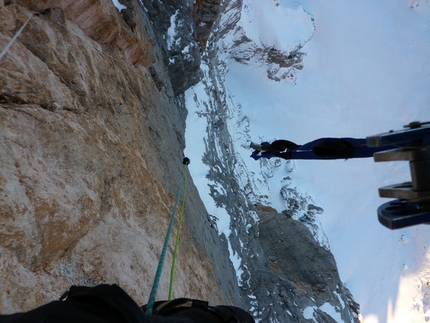
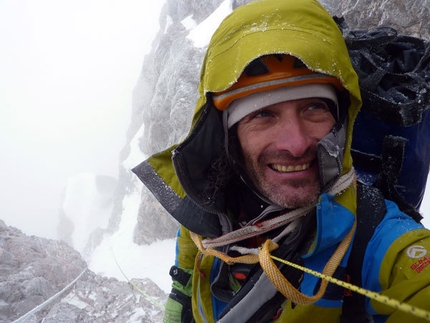
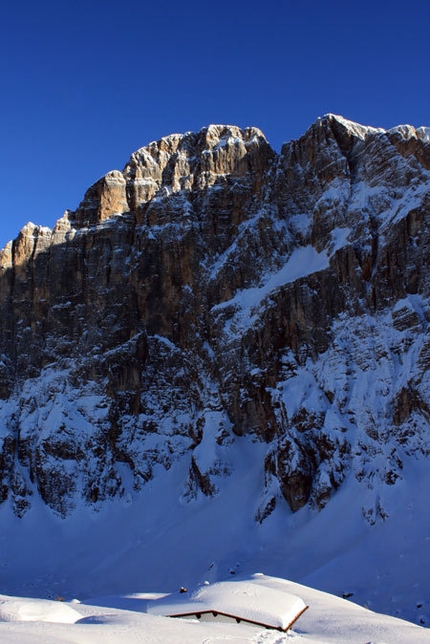
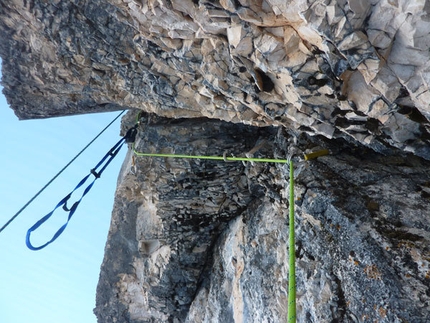
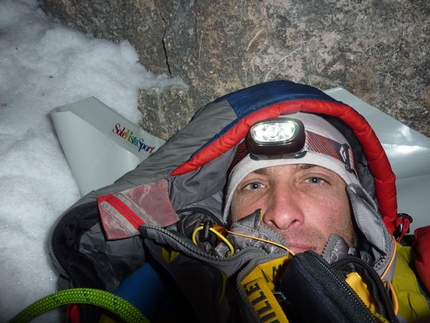
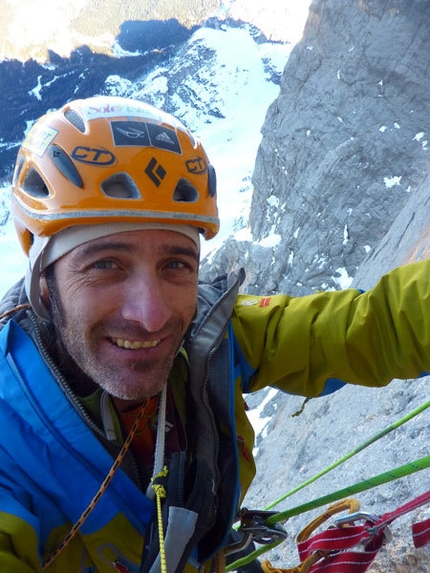
 See all photos
See all photos





















